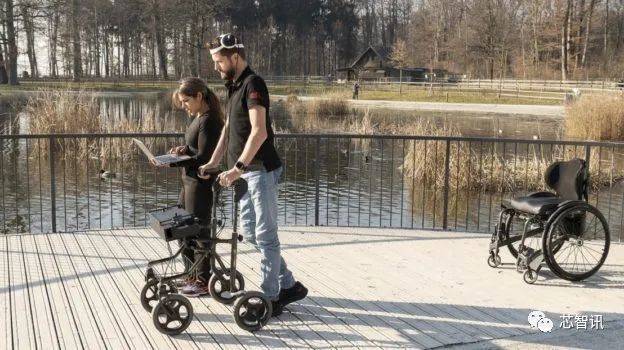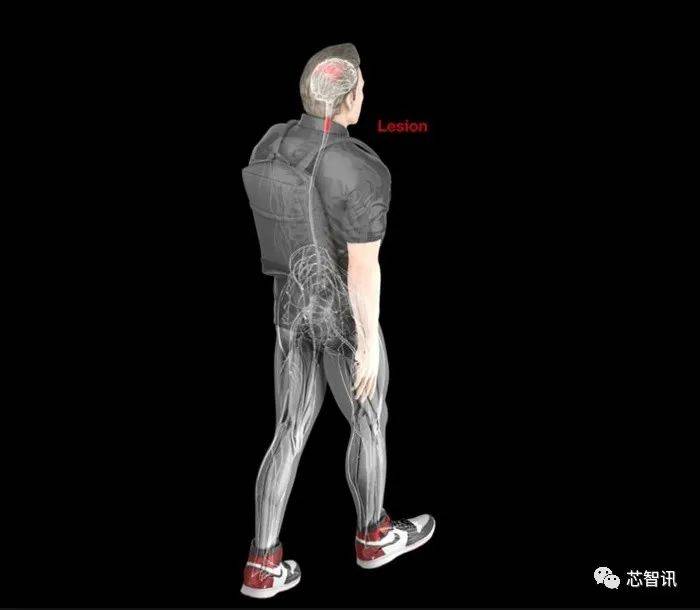 Technology peripherals
Technology peripherals
 AI
AI
 A Dutch man who has been paralyzed for 10 years regains walking with a brain-computer interface implant!
A Dutch man who has been paralyzed for 10 years regains walking with a brain-computer interface implant!
A Dutch man who has been paralyzed for 10 years regains walking with a brain-computer interface implant!

News on May 26, according to the Swiss Federal Institute of Technology in Lausanne, a recent study published in the journal Nature showed that researchers successfully helped a man with paralysis of the lower body through implanted brain-computer interface technology. A man who has been recovering for more than 10 years has had his brain and spinal cord reconnected. Now he has regained the ability to walk smoothly, whether on uneven terrain or climbing stairs, relying on mind control.
It is reported that this progress is the result of more than ten years of joint efforts by Swiss and French researchers. The two implants (one in the brain, the other in the spinal cord) create a "digital bridge" that can reestablish the connection between the patient's brain and spinal cord.

▲ This new technology is to implant the brain-computer interface above the area of the brain that controls leg movements (the red area of the brain). After interpreting the patient’s thoughts through computers and AI algorithms, the control instructions are transmitted to the patient through a portable device. With the spinal cord implant (red area below), patients can walk under the control of their thoughts.
Neurosurgeon Jocelyne Bloch, professor at CHUV, UNIL and EPFL, explains: “We implanted WIMAGINE® devices over the areas of the brain responsible for controlling leg movements. These devices, developed by CEA, are able to decode electrical signals and Like the brain feels like we're walking. We installed a neurostimulator above the spinal cord area to easily connect to the electrode array and control the leg movements.
Grégoire Courtine, professor of neuroscience at EPFL, CHUV and UNIL, said, “We used brain-computer interface (BCI) technology to create a wireless interface between the patient’s brain and spinal cord that converts thoughts into actions, allowing the patient to connect directly to the spinal cord. You can still walk naturally after the injury."
Guillaume Charvet, head of the CEA BCI project, added: "Thanks to algorithms based on adaptive artificial intelligence methods, motor intentions can be decoded in real time from the brain recordings. Next, by converting these intentions into spinal cord electrical stimulation sequences, the stimulation leg muscles to achieve the desired movement. The digital bridge operates wirelessly, allowing patients to move independently.
Gert-Jan, 40, of the Netherlands, participated in the trial and said he was injured in a bicycle accident, causing spinal cord damage, which resulted in paralysis. Now, he can control the movement of his paralyzed leg, allowing him to stand, walk and even climb stairs. Gert-Jan explains that he has regained the pleasure of being able to stand at the bar and share a beer with friends: “This simple pleasure represents a major change in my life”.
Gert-Jan regained neurological function lost after the accident, thanks to rehabilitation treatments supported by a digital bridge. Even with the digital bridge turned off, the researchers were still able to quantitatively sense and improve his motor skills. This digital restoration of the spinal cord shows that new neural connections have been formed.
However, at this stage, the digital bridge has only been tested on one person. Jocelyne Bloch and Grégoire Courtine explain that similar strategies could be used in the future to restore arm and hand function. They noted that digital bridges could also be used for other clinical indications, such as paralysis due to stroke. ONWARD Medical, together with CEA and EPFL, has received support from the European Commission through its European Innovation Council (EIC) to develop a commercial version of the digital bridge, with the goal of making the technology available globally.
Editor: Xinzhixun-Rurounijian
Xin Zhixun’s previous related articles:
"The United States will ban "brain-computer interface" technology from China"
"[In-depth analysis] The current situation and future of brain-computer interface technology! 》
"Brain-computer interface technology: gradually moving from science fiction to reality"
"Musk uses live pigs to demonstrate new brain-computer interface technology: pig brain information can be read in real time"
"Academician Luo Qingming: China has led the world in the field of "brain structure mapping and imaging"! 》
The above is the detailed content of A Dutch man who has been paralyzed for 10 years regains walking with a brain-computer interface implant!. For more information, please follow other related articles on the PHP Chinese website!

Hot AI Tools

Undresser.AI Undress
AI-powered app for creating realistic nude photos

AI Clothes Remover
Online AI tool for removing clothes from photos.

Undress AI Tool
Undress images for free

Clothoff.io
AI clothes remover

AI Hentai Generator
Generate AI Hentai for free.

Hot Article

Hot Tools

Notepad++7.3.1
Easy-to-use and free code editor

SublimeText3 Chinese version
Chinese version, very easy to use

Zend Studio 13.0.1
Powerful PHP integrated development environment

Dreamweaver CS6
Visual web development tools

SublimeText3 Mac version
God-level code editing software (SublimeText3)

Hot Topics
 What is Model Context Protocol (MCP)?
Mar 03, 2025 pm 07:09 PM
What is Model Context Protocol (MCP)?
Mar 03, 2025 pm 07:09 PM
The Model Context Protocol (MCP): A Universal Connector for AI and Data We're all familiar with AI's role in daily coding. Replit, GitHub Copilot, Black Box AI, and Cursor IDE are just a few examples of how AI streamlines our workflows. But imagine
 Building a Local Vision Agent using OmniParser V2 and OmniTool
Mar 03, 2025 pm 07:08 PM
Building a Local Vision Agent using OmniParser V2 and OmniTool
Mar 03, 2025 pm 07:08 PM
Microsoft's OmniParser V2 and OmniTool: Revolutionizing GUI Automation with AI Imagine AI that not only understands but also interacts with your Windows 11 interface like a seasoned professional. Microsoft's OmniParser V2 and OmniTool make this a re
 Replit Agent: A Guide With Practical Examples
Mar 04, 2025 am 10:52 AM
Replit Agent: A Guide With Practical Examples
Mar 04, 2025 am 10:52 AM
Revolutionizing App Development: A Deep Dive into Replit Agent Tired of wrestling with complex development environments and obscure configuration files? Replit Agent aims to simplify the process of transforming ideas into functional apps. This AI-p
 I Tried Vibe Coding with Cursor AI and It's Amazing!
Mar 20, 2025 pm 03:34 PM
I Tried Vibe Coding with Cursor AI and It's Amazing!
Mar 20, 2025 pm 03:34 PM
Vibe coding is reshaping the world of software development by letting us create applications using natural language instead of endless lines of code. Inspired by visionaries like Andrej Karpathy, this innovative approach lets dev
 Runway Act-One Guide: I Filmed Myself to Test It
Mar 03, 2025 am 09:42 AM
Runway Act-One Guide: I Filmed Myself to Test It
Mar 03, 2025 am 09:42 AM
This blog post shares my experience testing Runway ML's new Act-One animation tool, covering both its web interface and Python API. While promising, my results were less impressive than expected. Want to explore Generative AI? Learn to use LLMs in P
 How to Use YOLO v12 for Object Detection?
Mar 22, 2025 am 11:07 AM
How to Use YOLO v12 for Object Detection?
Mar 22, 2025 am 11:07 AM
YOLO (You Only Look Once) has been a leading real-time object detection framework, with each iteration improving upon the previous versions. The latest version YOLO v12 introduces advancements that significantly enhance accuracy
 Top 5 GenAI Launches of February 2025: GPT-4.5, Grok-3 & More!
Mar 22, 2025 am 10:58 AM
Top 5 GenAI Launches of February 2025: GPT-4.5, Grok-3 & More!
Mar 22, 2025 am 10:58 AM
February 2025 has been yet another game-changing month for generative AI, bringing us some of the most anticipated model upgrades and groundbreaking new features. From xAI’s Grok 3 and Anthropic’s Claude 3.7 Sonnet, to OpenAI’s G
 Elon Musk & Sam Altman Clash over $500 Billion Stargate Project
Mar 08, 2025 am 11:15 AM
Elon Musk & Sam Altman Clash over $500 Billion Stargate Project
Mar 08, 2025 am 11:15 AM
The $500 billion Stargate AI project, backed by tech giants like OpenAI, SoftBank, Oracle, and Nvidia, and supported by the U.S. government, aims to solidify American AI leadership. This ambitious undertaking promises a future shaped by AI advanceme





